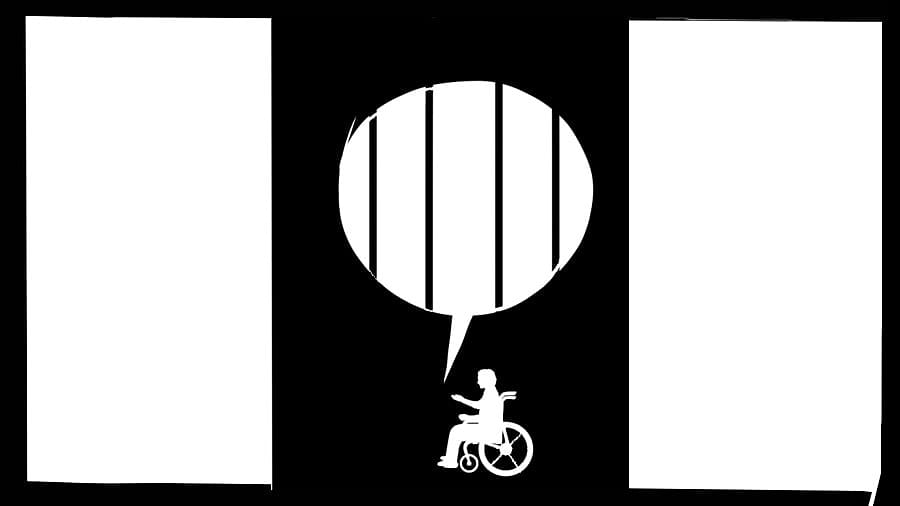
DH Illustration.
“This darkness is not permanent. With tomorrow’s dawn, this darkness will disappear,” wrote Vasantha Kumari Saibaba in Telugu on September 18, 2022, when I bought from her a book written by her husband, Professor G N Saibaba, titled Why do you fear my way so much? Poems and Letters from Prison.
I could not get an opportunity to meet Prof Saibaba in person, but I have tried to understand him from his letters and his poems. His recent death, barely months after his acquittal, has led to a deep sense of unease in me.
Prof G N Saibaba lost his ability to walk at the tender age of five. Despite facing many hardships in life, he secured District First position in the tenth grade. People who saw him in a wheelchair are perhaps not aware of the fact that before 2008, he used to crawl forward by the force of his hands, covering his palms with hawai chappals. He travelled in this manner throughout the country, bearing his body’s weight on his shoulders.
Despite these challenges, he participated in many mass movements and fought for the rights of Adivasis, Dalits, women, and minorities. Vasantha Kumari Saibaba believes that mass struggles and social movements in a way became his legs and made him walk. He secured a permanent faculty position as an assistant professor in the English Department at Ram Lal Anand College, Delhi University. His hands were his strength while his legs were motionless, but following his mistreatment in prison, he lost the strength of his hands too.
Prof Saibaba was falsely implicated in a case in 2014 for his alleged Maoist links and was sentenced to life imprisonment in 2017 by the Gadchiroli Sessions Court and underwent a decade-long incarceration under harsh, subhuman conditions. He was terminated from his service in 2021. In October 2022, the Bombay High Court initially acquitted him on a technical ground that there was no valid sanction under the Unlawful Activities (Prevention) Act (UAPA). In March 2024, the High Court acquitted him on merits, having found absolutely no basis for charges under UAPA. The Court held that the prosecution could not establish Prof Saibaba’s connection to any terrorist incident either by participating in its preparation or its direction or in any manner providing support to its commission. It further added that the UAPA offence of terrorism can’t be established merely based on the alleged downloading of materials containing Communist or Naxal philosophy.
A professor of English with 90 per cent disability confined to a wheelchair because of childhood polio, he was unfairly punished and victimised. In a letter to his students and his fellow teachers, Saibaba says, “I have lived all my conscious life on the campuses of learning and teaching in search of knowledge, love, and freedom. In the course of this search, I learnt that freedom for a few was no freedom.” Vasantha believes that a false allegation and a wrong judgement led to his unjust termination from his teaching job in 2021, which he loved the most. He was repeatedly denied access to medical treatment and bail by the courts.
Despite a decade-long solitary confinement in prison and significant deterioration in his health during that period, his works carried an unusual optimism. In a poem sent to his wife, he said, “Don’t shut the windows of your dreams. I am coming to see you like a whirlwind.” In another poem to Vasantha on October 26, 2017, he said, “I will stubbornly refuse to die. The sad thing is that they don’t know how to kill me because I love so much the sound of growing grass.”
During his incarceration, he went through a very difficult time. He was forbidden to read or write in Telugu, his mother tongue. Vasantha was not well versed in English and found it an agonising experience. How can two human beings not be allowed to converse in their language of love and intimacy? It was in fact literature that united them both and made them dream of lofty ideals. Moving from a small town after graduation, they read works of Tagore, Premchand, Periyar, Sarath, Chalam, Srisri, Koku Kara, and Ranganayakamma and were inspired by them. They together dreamt of an egalitarian society where there is no discrimination between castes, religions, or inequalities between the rich and the poor, men and women.
In a poem addressed to Varavara Rao, Prof Saibaba expressed deep concern over the self-imposed silences of people in the face of injustice, which he termed the true prison. In his powerful words, he said, “Some silence is imposed. Rest is self-imposed. Some censorship is ordered. Rest is self-practiced. It is this web that is cast around us. It’s not the fear for the powers-that-be, but it’s the fear in the voices to give voice to the voiceless. It is the moral decrepitude. It’s the hubris of a civilisation. It’s the amnesia of our combined histories in struggles for a free society.”
Prof Saibaba felt that he and his wife Vasantha were “small people working for small people’s rights in small ways. Why does this gigantic State fear our hopes, our love, our dreams?” he wondered. At the crux of the matter is the question, how does the State deal with those who espouse a different ideology, political dissidents, and prisoners of conscience? Should it battle them in the realm of ideas, or should it use draconian laws against them? How the State treats its prisoners and political dissidents can be a true test of our civilisational strength.
(The writer is the Vice Chancellor of the Assam Royal Global University)
(Disclaimer: The views expressed above are the author's own. They do not necessarily reflect the views of DH).